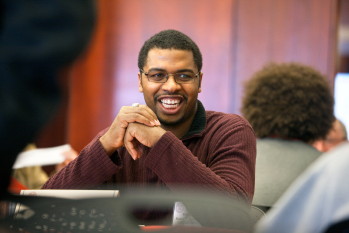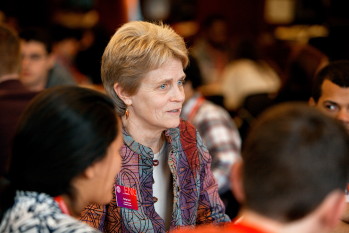COVER STORY
(Page 5 of 5)Marketing a department's social impact
Hemami also co-directs the CU-ADVANCE center, an NSF-funded initiative to recruit and retain more women faculty in science, technology, engineering and math – the so-called STEM fields – as well as social sciences. She points to the well-understood phenomenon that women, more than men, tend to be drawn to disciplines where they perceive a social impact of their work. This might explain why medical schools have much less difficulty attracting women than, say, graduate fields in mechanical engineering.

Hakim Weatherspoon, assistant professor of computer science, at the Diversity Hosting Weekend in April. See larger image
"Some engineering disciplines have obvious social impact, like civil and environmental, or chemical and biomolecular," Hemami says. "Some of the others do have equal social impact, but it is not as obvious." So beyond focusing on recruitment and retention strategies, Hemami thinks it's also important for individual disciplines to be better "marketers" – to show students that electrical engineering has as much potential to change the world as any other engineering field.
"If you go into a hospital, every single electrical device in there was designed by an electrical engineer," Hemami notes.
The past six years have seen gains in hiring women at Cornell, not only in engineering, but also in the traditionally male-dominated STEM fields, represented by 53 university departments. In 2004 17.7 percent tenured or tenure-track faculty in STEM fields were women; that had increased to 19.3 percent as of 2009-10, according to CU-ADVANCE data.

Betsy East, assistant dean for student services in the College of Engineering, speaks with prospective students during the college's joint Prospective Candidates Weekend and Diversity Hosting Weekend. See larger image
But sitting back and letting slow demographic shifts gradually increase diversity by attrition is not acceptable, and not enough, warns Paulette Clancy, professor of chemical and biomolecular engineering, who also served as her department's first woman chair, from 2002 to 2010. Improving things like the social climate for women is something that happens the more representation there is, she observes.
And attrition is indeed a slow process. "We have to look at how many we are bringing in minus those leaving," she says. "I think this has contributed to why we are not growing as fast. It's not because we haven't made great efforts. There are a number of reasons why people leave, but if there are any reasons we can fix, we should look into them and make a concerted effort."
<<View entire story as one page>>